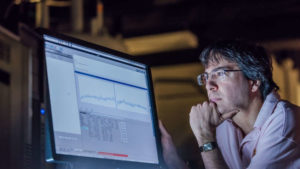University of Toronto researcher Lewis Kay wins the 2018 Herzberg Gold Medal, which comes with $1M

Lewis Kay, a Toronto researcher who developed a technique to watch microscopic proteins reposition themselves and change their shapes within cells, has won the $1 million Herzberg Gold Medal, Canada’s top science prize.
Kay, a professor of biochemistry at the University of Toronto and a senior scientist at the Hospital for Sick Children, has spent his career improving nuclear magnetic resonance spectroscopy, the technology behind the MRI scans used for medical imaging of the human body.
But Kay uses it to look at things on a much smaller scale, to see how proteins shape-shift and move in ways that change what kinds of things they can do within the human body — including causing disease.
“What happens when they assume a shape that is very rare, even for them? Often that’s where the interesting functionality occurs,” Kay said in a video interview with Mario Pinto, President of the Natural Sciences and Engineering Research Council (NSERC), the federal agency that awards the Herzberg medal annually.
Kay will receive the award at a ceremony at Rideau Hall in Ottawa Tuesday evening, alongside the winners of other top science prizes from NSERC.
The Herzberg medal is awarded to one top Canadian researcher annually for “both excellence and influence” based on recommendations from peers. It is named after Gerhard Herzberg, a Canadian scientist who won the 1971 Nobel Prize in Chemistry.
The medal comes with a $1 million grant spread out over five years.
Kay said with that money, his lab will “continue to do what we do best, which is just to listen to what the molecules are trying to tell us.”
Kay won another prestigious Canadian research prize, a Canada Gairdner International Award, in 2017.


